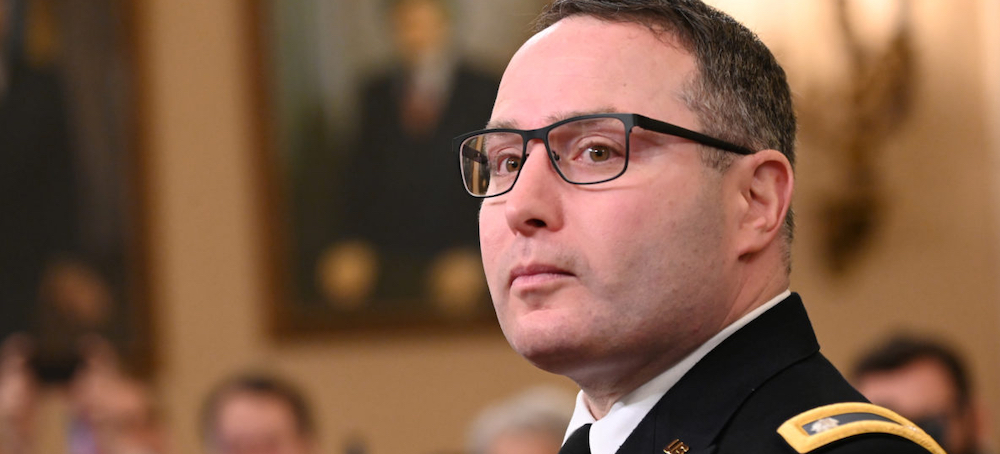Russia Attacks
Alexander Vindman Substack Alexander Vindman. (photo: Erin Scott/Reuters)
Alexander Vindman. (photo: Erin Scott/Reuters)
The domestic political turmoil in the U.S. and the paralysis in the Euro-Atlantic alliance in conceiving and implementing a strategy for the Russia-Ukraine war resembles some of the key conditions that propelled Putin to launch the 2022 war. Prior to the invasion, Putin perceived American society and the United States’ political decision-making structure to be in disarray. The January 6th insurrection reflected the depth of American political division and throughout 2021 Trump hammered away at his personal narratives that Putin wasn’t a menace, Russia was a potential ally, and Ukraine was the culprit behind tension in Eastern Europe and an enemy. Trump was a former president but remained the leader of a Republican party that was increasingly pliant to whatever extreme position he wished to pursue. For Putin, this capture of the Republican establishment signaled that a swift and successful Russian victory would result in no significant western backlash.
The same conditions that invited Russia’s decision to attack Ukraine appear again today in the context of NATO. Putin has demonstrated a penchant for war optimism and miscalculation. He may read Trump’s recent signals and interpret the current security environment much like he did in the leadup to 2022. This is a recipe for a dangerous miscalculation and direct confrontation between Russia and NATO.
Conventional wisdom suggests Trump’s invitation for Russia to attack NATO is contingent on a Trump victory in November 2024. In this frame, Trump’s pronouncement signals to Putin that a second Trump administration would result in NATO absent U.S. leadership. Despite congress barring the President from unilaterally withdrawing from any alliance, the Executive Branch retains wide latitude to conduct foreign policy. Thus, even if the U.S. were to remain in NATO, a Trump administration could simply choose not to act when faced with a collective defense NATO Article V scenario.
More dangerous is the relevance of Trump’s pronouncement to America’s security, today. If the Republican party is prepared to about-face on border security because Trump demands it. Putin may very well interpret the willingness of the Republican Party to about-face on defending NATO. The result would be political paralysis in the United States. Putin may view this as an alluring, fleeting, and unique opportunity that must be exploited to achieve one of his vital long-term objectives.
Consequently, Trump has significantly advanced the possibility of a war with Russia because he alone has eroded the principle of collective defense that undergirds the NATO alliance. This principle embodied in Article V of NATO, the concept that “an attack on one is an attack on all”, successfully warned-off the Soviet Union for generations. Because of Trump’s recent pronouncement, decades worth of collective defense is in doubt. Vladimir Putin has stated that one of his paramount objectives is the destruction of NATO, he may soon be willing to exploit the chaos and accept Trump’s invitation test the resolve of NATO.
As Russia is bogged down in Ukraine with limited resources for a large-scale confrontation with NATO, this would likely be a limited strike. For instance, Russia can attack to seize a land corridor between the Russian exclave of Kaliningrad and Belarus across Lithuania’s Suwalki Gap. This is the exact scenario that the U.S. government fears most and assesses as the likely flashpoint for a confrontation between Russia and NATO.
A limited Russian attack on NATO during the Biden Administration would likely be a grave miscalculation by Putin. The executive branch has wide latitude in conducting foreign policy and national defense. Congress has a war powers role, but it is not a reflexive or immediate function. Even obstruction by Republicans in the House of Representatives would not be enough to prevent a rapid and meaningful response by the Biden administration if Article V is evoked. Furthermore, some of NATO’s defensive actions are automated with authorities granted to the Supreme Allied Commander of U.S. forces in Europe and NATO to defend U.S. forces.
The Biden administration has also eroded its own ability to deter Russian aggression. Succumbing to nuclear blackmail due to fears of escalation, the United States and the West have fallen far short of providing the necessary support to help Ukraine defend against Russia. The combination of failed policies to deter Russian aggression across multiple administrations, the Biden administration’s indecisive response to the Russia-Ukraine war, and Trump’s invitation for Russia to attack NATO have all greatly eroded deterrence. With Trump’s invitation to attack NATO, Trump’s influence over the Republican Party creating paralysis and Putin’s penchant for miscalculation and opportunism we now face uniquely dangerous risk of a confrontation with Russia.
We are entering a particularly dangerous moment in U.S.-Russia relations. Decisive action is essential. A bipartisan effort to signal NATO is sound and collective defense is ironclad must be implemented immediately. Putin must be disabused of any perceptions that the U.S. would fail to act to defend NATO. And the House must immediately return to congress and the GOP must pass the National Security Bill carrying $60 Billion in aid to Ukraine. Rather than relying on appeasement and the prospects of “cooperation” with Russia, American policymakers must show that the United States is willing to stand by our defensive alliances. Failure to do so will not only see the death of deterrence, it would invite disaster.



